Cleaners in Oven Cleaning
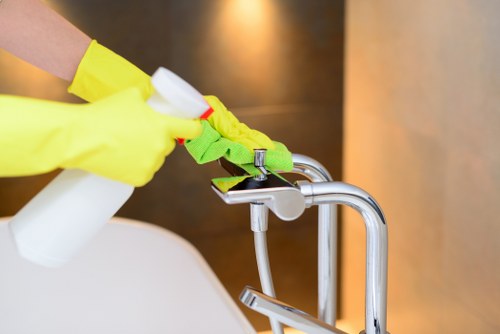
Keeping your oven clean is essential not only for maintaining its efficiency but also for ensuring the safety and quality of your cooking. Over time, ovens accumulate grease, food residues, and burnt-on spills that can affect performance and even lead to unpleasant odors. Utilizing the right cleaners in oven cleaning can make this task significantly easier and more effective.
There are various types of oven cleaners available on the market, each designed to tackle specific cleaning challenges. From chemical-based solutions to natural alternatives, selecting the appropriate cleaner depends on your preferences, the level of grime, and the oven type you own. Understanding the different options can help you achieve a sparkling clean oven without compromising your appliance's integrity.
In this comprehensive guide, we will explore the best cleaners for oven cleaning, effective cleaning techniques, safety precautions, and tips to maintain your oven's cleanliness. Whether you're a homeowner looking to tackle the job yourself or considering professional cleaning services, this article provides valuable insights to ensure your oven remains in top condition.
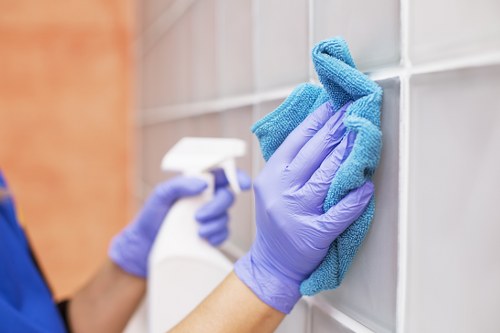
The Importance of Regular Oven Cleaning
Regularly cleaning your oven is crucial for several reasons. First and foremost, a clean oven operates more efficiently, reducing energy consumption and extending the appliance's lifespan. Accumulated grease and food particles can cause the oven to work harder, leading to increased energy bills and potential wear and tear.
Moreover, a clean oven ensures that your food tastes better and is free from unwanted flavors caused by residual spills and burnt-on substances. This is particularly important for baking and roasting, where even slight contamination can affect the final dish's taste and appearance. Additionally, maintaining a clean oven reduces the risk of fires caused by excessive grease buildup, enhancing kitchen safety.
Investing time in regular oven cleaning also preserves the appliance's resale value. Prospective buyers often prefer appliances that have been well-maintained, and a spotless oven can be a significant selling point. Overall, consistent oven maintenance contributes to a healthier, more efficient, and safer kitchen environment.
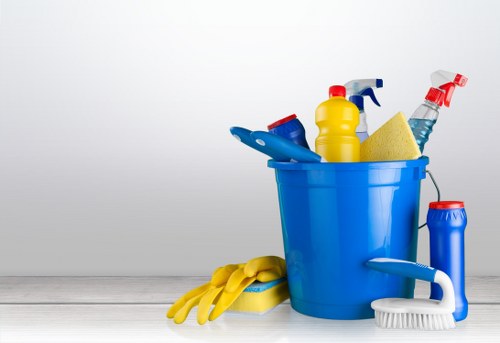
Types of Oven Cleaners
Choosing the right cleaners in oven cleaning involves understanding the different types available and their specific applications. Here are the most common types:
Chemical Oven Cleaners
Chemical oven cleaners are powerful solutions that effectively dissolve tough grease and burnt-on food residues. They typically contain strong alkaline substances like sodium hydroxide, which react with organic matter to break it down. These cleaners are ideal for heavily soiled ovens but require careful handling due to their corrosive nature.
Steam Cleaners
Steam ovens use high-temperature steam to loosen and remove grime without the need for chemical agents. This method is environmentally friendly and reduces exposure to harsh chemicals. Steam cleaning is suitable for regular maintenance and light to moderate cleaning tasks.
Natural Cleaners
For those who prefer eco-friendly and non-toxic options, natural oven cleaners made from ingredients like baking soda, vinegar, and lemon juice are excellent choices. While they may require more elbow grease and time to achieve the same results as chemical cleaners, they are safer for both the user and the environment.
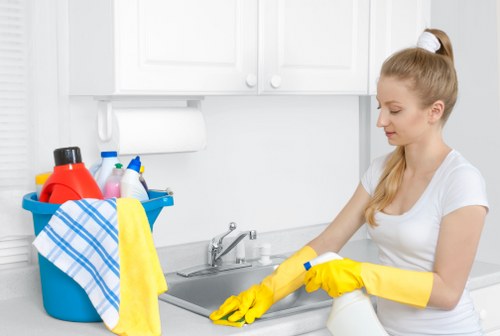
How to Use Chemical Oven Cleaners Safely
When opting for chemical oven cleaners, it's essential to follow safety guidelines to prevent accidents and ensure effective cleaning:
- Ventilation: Ensure the kitchen is well-ventilated by opening windows and turning on exhaust fans to dissipate fumes.
- Protective Gear: Wear gloves and eye protection to safeguard your skin and eyes from the corrosive chemicals.
- Application: Apply the cleaner evenly across the oven's interior surfaces, avoiding heating elements and other sensitive parts.
- Waiting Period: Allow the cleaner to sit for the recommended time, usually ranging from 20 minutes to several hours, to break down the grime effectively.
- Removal: Wipe away the cleaner and loosened debris with a damp cloth or sponge, ensuring all residues are thoroughly removed.
Always read and follow the manufacturer's instructions on the cleaner's label to ensure safe and effective use.
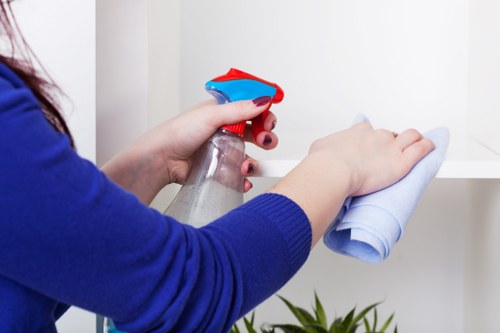
Effective Techniques for Oven Cleaning
Regardless of the type of cleaner you choose, employing effective cleaning techniques is crucial for achieving optimal results:
Preparation
Start by removing all racks, trays, and other removable components from the oven. These can be cleaned separately using the same cleaners to ensure a comprehensive cleaning process.
Applying the Cleaner
Apply your chosen cleaner generously to all interior surfaces, focusing on areas with heavy buildup. For natural cleaners, create a paste using baking soda and water, and spread it evenly across the oven surfaces.
Scrubbing
Use a non-abrasive scrubber or sponge to gently scrub the surfaces, paying extra attention to stubborn stains. For chemical cleaners, adhere to the recommended waiting period before scrubbing.
Rinsing
After scrubbing, thoroughly rinse the oven with clean water to remove any remaining cleaner and debris. Ensure that all residues are eliminated to prevent contamination during future cooking.
Drying
Use a dry cloth or allow the oven to air dry completely before reassembling and using it again.

Preventive Measures for Maintaining a Clean Oven
Preventing excessive buildup in your oven can save time and effort in the long run. Here are some preventive measures to keep your oven clean:
- Cover Dishes: Use oven-safe covers or foil to prevent spills and splatters during cooking.
- Regular Wiping: Wipe down the oven after each use while it's still warm to easily remove any minor spills.
- Use Oven Liners: Place oven liners or baking sheets on the bottom rack to catch drips and crumbs.
- Avoid Overheating: Monitor cooking temperatures to prevent food from burning and sticking to the oven surfaces.
- Schedule Cleanings: Establish a regular cleaning schedule, such as monthly or quarterly, depending on usage frequency.
Implementing these practices can significantly reduce the effort required for deep cleaning sessions and maintain your oven's appearance and functionality.
Additionally, addressing spills and stains promptly prevents them from hardening and becoming more challenging to remove later.
Maintaining a clean oven not only enhances its performance but also contributes to a more hygienic cooking environment.

Choosing the Right Cleaner for Your Oven Type
Different oven types may require specific cleaning approaches. Here’s how to select the appropriate cleaners in oven cleaning based on your oven type:
Electric Ovens
Electric ovens often have more accessible surfaces for cleaning. Chemical cleaners work effectively on electric ovens, but it's essential to avoid getting the cleaner on heating elements. Steam cleaning is also a safe and effective method for regular maintenance.
Gas Ovens
Gas ovens may have different interior configurations, making thorough cleaning more challenging. Use cleaners that do not leave excessive residue and ensure all parts are adequately rinsed to prevent clogs in gas lines.
Self-Cleaning Ovens
Self-cleaning ovens use high temperatures to burn off residues, requiring minimal manual cleaning. However, using gentle cleaners and regular wiping can extend the self-cleaning cycles and maintain optimal performance.
Convection Ovens
Convection ovens circulate air, which can distribute grease and spills more evenly. Regular cleaning with appropriate cleaners helps prevent buildup on fan blades and other components, ensuring efficient airflow and cooking performance.

Eco-Friendly Oven Cleaning Solutions
For environmentally conscious individuals, eco-friendly cleaners in oven cleaning offer effective cleaning without harmful chemicals. Here are some popular natural alternatives:
Baking Soda and Vinegar
A mixture of baking soda and vinegar creates a powerful cleaning paste that can break down grease and grime. Apply the paste, let it sit, and then scrub away for a spotless oven.
Lemon Juice
Lemon juice's natural acidity helps dissolve stains and leaves a fresh, pleasant scent. Mix lemon juice with water or baking soda for enhanced cleaning power.
Castile Soap
Castile soap is a versatile, plant-based cleaner that can effectively remove grease and residues. Combine it with warm water and use it to wipe down oven surfaces.
Essential Oils
Adding essential oils like tea tree or lavender to your cleaning solutions can provide antibacterial properties and a pleasant aroma, enhancing the cleaning experience.
- Benefits of Eco-Friendly Cleaners:
- Non-toxic and safe for families and pets.
- Biodegradable and environmentally sustainable.
- Cost-effective and often made from readily available ingredients.
- Reduces exposure to harsh chemicals and fumes.
Switching to natural cleaning solutions not only benefits your health and the environment but also ensures a safer kitchen space.

Professional Oven Cleaning Services
While DIY cleaning methods are effective, sometimes professional cleaners in oven cleaning may be necessary, especially for stubborn stains or extensive buildup. Professional services offer several advantages:
- Expertise: Trained technicians understand the best cleaning techniques and products for different oven types.
- Efficiency: Professionals can complete the cleaning process quickly and effectively, saving you time and effort.
- Safety: Handling strong chemical cleaners can be hazardous. Professionals use safe methods to avoid damaging your oven or harming themselves.
- Comprehensive Cleaning: Professional services often include thorough cleaning of all oven components, ensuring no residue is left behind.
Investing in professional oven cleaning can be particularly beneficial for commercial kitchens or households with heavy oven usage, where maintaining a pristine oven is essential for hygiene and performance.
If you're struggling with persistent oven grime or prefer a hassle-free solution, consider reaching out to a reputable cleaning service. Contact us today to schedule a professional oven cleaning session and experience the difference firsthand.

Common Mistakes to Avoid When Cleaning Your Oven
To ensure effective oven cleaning and prevent damage, avoid these common mistakes:
- Ignoring Manufacturer Instructions: Always follow the oven manufacturer's guidelines for cleaning to maintain warranties and prevent voiding them.
- Using Abrasive Tools: Harsh scrubbing pads or steel wool can scratch and damage oven surfaces. Opt for non-abrasive scrubbers instead.
- Overusing Chemical Cleaners: Excessive use of chemical cleaners can corrode oven components. Use them sparingly and as directed.
- Neglecting Rinsing: Failing to thoroughly rinse the oven after cleaning can leave harmful residues that contaminate food.
- Waiting Too Long Between Cleanings: Allowing buildup to accumulate makes cleaning more difficult and increases the risk of damage.
By being aware of these pitfalls, you can maintain your oven more effectively and extend its lifespan.
Additionally, always prioritize safety by wearing protective gear and ensuring proper ventilation during the cleaning process.
Adhering to best practices ensures your oven remains in excellent condition, providing reliable performance for years to come.

Tips for Maintaining a Clean Oven
Maintaining oven cleanliness requires ongoing effort and attention. Here are some practical tips to keep your oven spotless between deep cleanings:
- Use Baking Sheets: Place baking sheets or aluminum foil on lower racks to catch drips and spills, making cleanup easier.
- Cover Foods: Use lids or covers when baking to prevent splatters and reduce the need for frequent cleaning.
- Organize Oven Racks: Maintain a consistent rack arrangement to ensure even heat distribution and minimize food spills.
- Avoid Excessive Heating: High temperatures can cause food to burn and adhere to oven surfaces, necessitating more intensive cleaning.
- Regular Inspections: Periodically check for spills, stains, and buildup, addressing them promptly before they worsen.
Implementing these maintenance habits can significantly reduce the frequency and intensity of deep cleaning sessions, preserving your oven's appearance and functionality.
Moreover, a well-maintained oven contributes to overall kitchen hygiene and safety, creating a more pleasant cooking environment.
By integrating these practices into your routine, you can enjoy a clean and efficient oven with minimal effort.

Benefits of a Clean Oven
A clean oven offers numerous benefits that extend beyond aesthetics. Here are some key advantages:
Enhanced Cooking Performance
A spotless oven ensures even heat distribution, preventing hot spots and uneven cooking. This results in better-tasting and consistently cooked meals, whether you're baking, roasting, or broiling.
Energy Efficiency
Accumulated grime and residues can insulate oven surfaces, forcing the appliance to use more energy to reach desired temperatures. A clean oven operates more efficiently, reducing energy consumption and lowering utility bills.
Improved Safety
Grease buildup is a common fire hazard in kitchens. Regular cleaning minimizes the risk of grease fires, ensuring a safer cooking environment for you and your family.
Longevity of the Oven
Proper maintenance and cleaning prevent corrosion and wear on oven components, extending the appliance's lifespan. This reduces the need for costly repairs or premature replacement.
Health Benefits
A clean oven eliminates mold, bacteria, and allergens that can thrive in dirty environments. This promotes a healthier kitchen space and reduces the risk of food contamination.

Conclusion
Maintaining a clean oven is a fundamental aspect of kitchen upkeep that offers numerous benefits, from improved cooking performance to enhanced safety and energy efficiency. By selecting the right cleaners in oven cleaning and employing effective techniques, you can achieve a spotless oven with ease.
Whether you choose chemical cleaners, steam cleaning, or natural alternatives, understanding the pros and cons of each method is essential for making an informed decision. Additionally, incorporating preventive measures and routine maintenance can significantly reduce the effort required for deep cleaning sessions.
For those who prefer a hands-off approach or face particularly stubborn oven grime, professional cleaning services provide an efficient and thorough solution. Investing in professional assistance ensures your oven remains in optimal condition, prolonging its lifespan and maintaining its resale value.
Remember to avoid common cleaning mistakes by following manufacturer guidelines, using appropriate tools, and prioritizing safety throughout the process. By doing so, you'll not only keep your oven looking pristine but also ensure it functions effectively for all your culinary endeavors.
Take the first step towards a cleaner, more efficient oven today. Contact us today to learn more about our oven cleaning services and how we can help maintain your kitchen's heart.